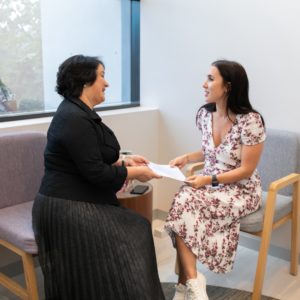ICSI, or Intracytoplasmic Sperm Injection, is a specialised form of IVF whereby a single sperm is injected directly into a mature egg using very fine micro-manipulation equipment to assist fertilisation. It is often used for the treatment of severe cases of male-factor infertility.
Who is ICSI Treatment suitable for?
ICSI is generally recommended for couples who have been diagnosed with male infertility issues including low sperm count, low sperm morphology or motility or anti-sperm antibodies. ICSI can also be recommended if you have previously had poor or no fertilisation rates using ICF, a vasectomy or an unsuccessful vasectomy reversal.
What does the ICSI procedure involve?
With ICSI, the eggs are retrieved from the female partner following ovarian stimulation, then sperm are selected and prepared for insemination. A single sperm is then directly injected into each mature egg, and these are placed into an incubator and checked for fertilisation. The embryos are then grown in the lab and if successful, are transferred back into the female partner. In most cases, only one embryo is transferred, and any remaining good quality embryos are frozen and stored for future treatments, if needed.
How much does ICSI cost?
ICSI costs around $11,000 per cycle. You can expect to have around half of this covered by Medicare, or a little more if you have reached your Medicare Safety Net for the calendar year. See the IVF Australia ICSI web page for a breakdown of costs.
What are the success rates for ICSI?
The success for ICSI rates are similar to the success rates for IVF. The success rates range from a live birth rate of 38.9% per embryo transfer for patients under 34 years, to a live birth rate of 5.6% per embryo transfer for patients over 43 years. Dr Raewyn can discuss your individual situation with you to give you an indication of your chance of successfully conceiving with ICSI.
Are there any risks associated with ICSI?
There is no convincing evidence to show that there is any increased incidence of birth defects in children born from the ICSI process compared with the general population. However, there is a slight increase that a male child born as a result of ICSI may have a fertility problem similar to his father’s.



